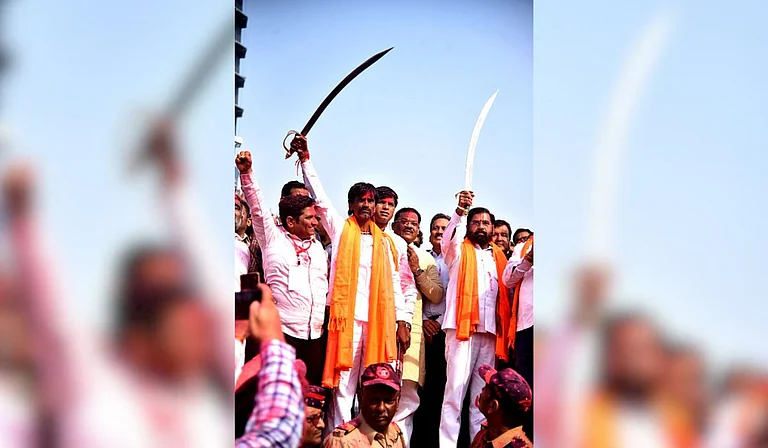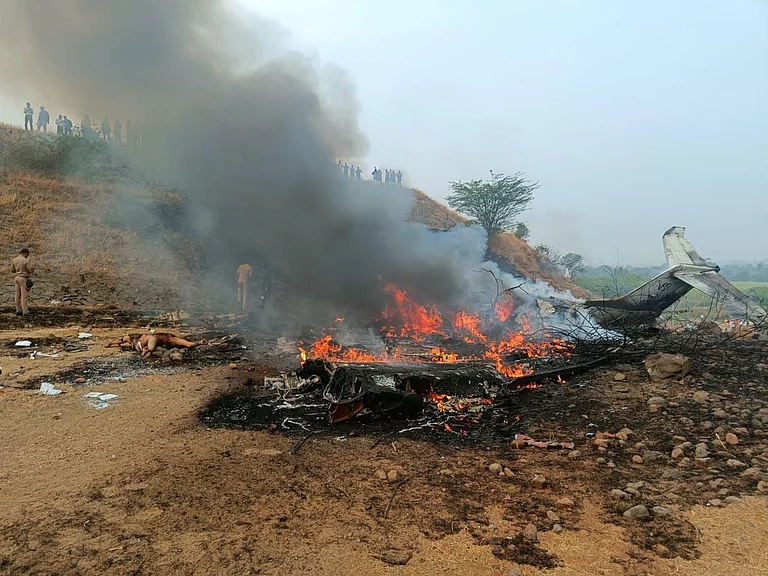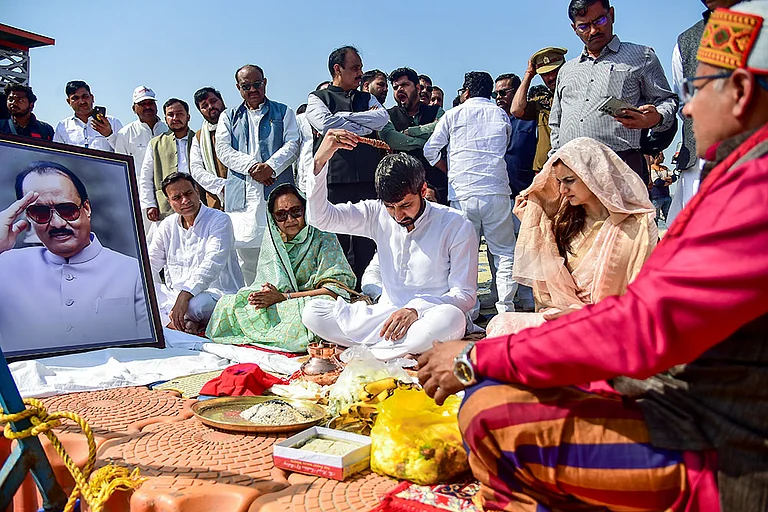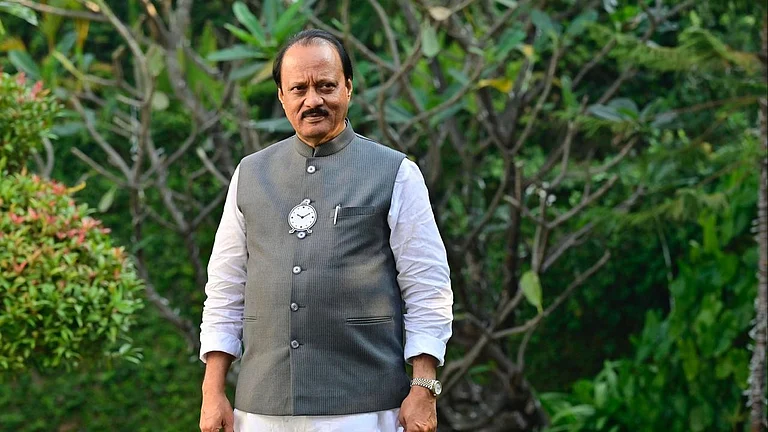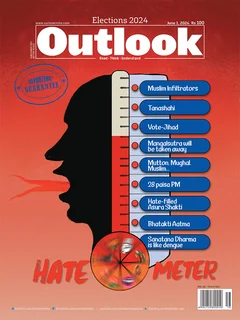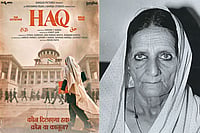Maratha reservation quota activist Manoj Jarange Patil is the antithesis of the conventional idea of a Maratha—of robust build, booming voice and bellicose by nature. Patil is diminutive, weighs 42 kg and speaks softly. But there is steel in his eyes and he has the quiet confidence of a person who has massive grassroot support. We meet him at Antarwali Sarathi village in Jalna district, in the compound outside the house where he began his agitation in August last year. A statue of Chhatrapati Shivaji is placed prominently to which he bows before talking to us.
Patil and his supporters have been agitating for reservations for the Marathas in government jobs and educational institutions. Broadly, this is their demand: the farmer community within the Marathas, called the Kunbis, already enjoys reservation under the OBC (Other Backward Community) quota. Patil wants this to be extended to all Marathas, estimated to be 35 per cent of Maharashtra’s population. Though he has been involved in the agitation for the Maratha quota for 15 years, he made headlines when he went on a hunger strike in February this year. The 17-day fast ended when Chief Minister Eknath Shinde assured Patil he would look into their demands.
Maratha reservation is a major issue in these elections in Maharashtra. Though Patil insists he is not against any particular party or alliance, the Shinde-Fadnavis government is certainly concerned. “I am not going to support any party. The government has deceived us but we will not ask anyone to vote for any particular party. I can’t say what will happen in the elections, but you must have noticed that Modiji is doing more rallies in Maharashtra now,” he says, pointing to how seriously the Bharatiya Janata Party (BJP) is taking his agitation.

But Patil is not going to stay apolitical for long. He says there was too little time to form a political party before the Lok Sabha elections. But he will certainly form his political party and fight in all the 288 seats in the assembly elections slated later this year. According to him, at least 67 seats are decided directly by the Marathas.
An additional quota for the Marathas will upset the balance for the rest of the OBCs in Maharashtra, a reason why many OBC leaders are wary of Patil. “Marathas are not backward. There have been more than 10 Maratha chief ministers in the state,” says old OBC warhorse Chhagan Bhujbal. We meet him at his sprawling office in Nashik, looking fighting fit at 76, in white beard and matching dhoti-kurta. Bhujbal says the Kunbis are indeed an OBC caste, but now Patil and his men have started talking of a Maratha-Kunbi caste. “What’s that? They say they are poor. I tell them there is a separate reservation for the economically backward, they can go for it. But no, they are saying they want reservation under the OBC category only. That can’t be given,” he says. Bhujbal accuses the agitators of attacking the houses of OBC people in Beed. Patil, in turn, says their agitation has been absolutely peaceful; it was the state police who fired pellets at the protestors which injured many.
Shinde says his government has taken the most number of steps to address the Maratha quota issue. We meet him at his Thane residence. He rushes into the room where we are waiting after addressing a rally where the temperature was 42 degrees Celsius, apologising for being late. He goes up to his bedroom to freshen up and settles down for the interview, talking in a measured, assured tone. “Those who ruled the state previously used the Marathas for their political gains. They did not give them reservation when they should have. It was in their domain to give them the reservation, but they didn’t. When we came to power, the first thing we did was speak to the Maratha community,” he says.
Earlier, the Maratha reservation matter had gone to the High Court, and then to the Supreme Court, which rejected it. The court said the Maratha community will have to prove that it was socially and economically backward. Shinde says they worked on that, they established the Backward Commission. He says they called for a session of the assembly to address the Maratha issue. “The Kunbis were also not getting their certificates. We set up the Justice Shinde Commission and made it happen. The previous government did nothing for the Marathas. They just keep criticising us,” says Shinde.
Onions Bring Tears
The Lasalgaon Onion Market in Nashik is said to be Asia’s largest. The day we visit, it is eerily empty. The farmers and traders are on a strike in protest against the government’s ban on the export of onions. The ban has been lifted now, but there is a minimum export price (MEP) plus a 40 per cent export duty which the traders say makes Indian onions very expensive in the world market. The traders say the Union government was worried about inflation before the elections and banned onion exports so that the domestic price doesn’t shoot up. Rising onion prices have brought down regimes in the past in India. But in the hurry to contain domestic prices, the farmer has been hit the most, they allege.
The government is certainly on the back-foot on the farmers’ issue, but Shinde says they are addressing it. He says his government is giving them even more benefits than the National Disaster Response Force for crops destroyed due to unseasonal rains. “In the last nearly two years, we have given compensation worth Rs 15,000 crore to farmers. Modiji is giving farmers Rs 6,000 annually. We have added Rs 6,000 to that. So farmers in Maharashtra are getting Rs 12,000 in total. Earlier, for crop insurance, farmers used to pay the premium. Now we are paying. If we add up everything, we have spent more than Rs 35,000 crore on farmers. So how can people say that we have not done anything? Only the opposition is saying this,” he says.
According to him, the onion farm distress has also been resolved. The export ban has been lifted and the farmers will see the prices going up soon. “We are very particular about the issues of farmers. Not just now, during the elections, but even otherwise. I personally call the divisional commissioners and district magistrates and insist on speedy panchnamas and surveys,” says Shinde.
The Maharashtrian Character
Many people during our travel through Maharashtra, from farmers to fishermen, doctors to domestic helpers, and students to social workers talk of the Maharashtra character, of family values, of being averse to deceit and treachery, of democratic politics. They see the recent events in Maharashtra politics—the Shiv Sena splitting up, the National Congress splintering into the Sharad Pawar and Ajit Pawar factions—as unsavoury.
At a dinner with prominent residents of Nashik, many talk of this nebulous sentiment having an impact on the elections. “Sentimentally, people in Maharashtra are attached to family values. They have an emotional connect to Balasaheb (Thackeray) and Sharad Pawar. There is also the Maharashtra-Gujarat conflict. They feel the Gujaratis have come here and engineered the split in their homegrown parties. These machinations may be accepted in the politics of the north, but in Maharashtra, the voters view them as unpleasant and stopping very low,” says Sudhir Sankalecha, a consulting pathologist in Nashik.
The parties themselves are still bitter about these recent cataclysmic changes. We meet former Maharashtra chief minister, Balasaheb Thackeray’s son and the Shiv Sena supremo, Uddhav Thackeray at the legendary Matoshree in Mumbai, the house the party’s founder built. He is easy going and succinct in his replies to our questions. We ask him if he feels betrayed by those who have left the party? “Yes, what else can we call it?” he shoots back. “I don’t want to tell the same story again and again. I underwent a spine surgery. Even my fingers were numb. It was then that they plotted this. It was reported in the papers, how they used to meet at night, their people used to come, our people used to go. The BJP did this. The present CM, we call him a traitor. It was a murky plot. They did all this when I was not in a position to say anything. But even the Supreme Court has said that which party belongs to whom, it can’t be determined based on the MPs and MLAs,” he says. Thackeray says he will never take back those who have left his party under any circumstances. The doors are closed for them, he says.
We ask the same question to Shinde, whether there is sympathy for Thackeray among the voters, do they feel he has been betrayed? His answer is an emphatic no. “All this is being said to create confusion. They made a big mistake. The Shiv Sena-BJP was the natural alliance. They should have formed the government. But the Congress and the others formed the government. Anyway, what is done is done,” he says.
The split in the Nationalist Congress Party (NCP) is even more personal as its founder Sharad Pawar and his nephew, Ajit Pawar, whom many considered the political heir, parted ways. We meet the party patriarch Sharad Pawar and his daughter Supriya Sule at a conference room at the Y B Chavan Centre near Mantralaya in Mumbai. His speech is not so clear after his oral surgery, but his mind is razor-sharp at 83. Sharad Pawar hints that people like Ajit Pawar and party loyalist Praful Patel split the NCP as they were under pressure from law enforcement agencies. “But there is no confusion among the voters which is the real NCP. They are very clear about the party symbol,” he says.
It’s a direct fight between Sharad Pawar’s daughter Supriya Sule and Ajit Pawar’s wife Sunetra Pawar in Baramati constituency, an area nurtured by Sharad Pawar for many years. How has it been for her to contest against a close relative? “Ajit Pawar has made it much easier for me,” she replies. “He is talking so much that I had to do nothing. I would like to believe that my seven months of campaigning were flawless. I don’t think there is any confusion among the voters; they know the real NCP is ours. There was a clear-cut divide. I don’t think for me it was a personal battle at all. The opponent against me has just joined politics, it would be unfair of me; I would be a bully if I went after her, which I am not. She didn’t even have an opinion on anything, why would I go after a soft target?” asks Sule.
The Maharashtra elections this year will beat any Bollywood potboiler. Sule’s fight in Baramati against Sunetra Pawar will be only one of the many prestigious contests to watch out for. There are too many leaders whose future is locked in the EVMs. There is Shinde, who quickly put together an alliance with the BJP and the Ajit Pawar faction of the NCP. Will they find credibility among the voters? There is Uddhav Thackeray, how much will the split hurt his party? For Devendra Fadnavis, the former BJP chief minister (and now deputy chief minister), it will be a question of how long he will continue to play second fiddle? For Sharad Pawar, it will be a test of the ‘real’ NCP as he calls his faction. For Ajit Pawar, the challenge will be to keep the flock together, depending on the poll results. Bhujbal will find out if he is still relevant among the OBC voters. And Patil will discover if the Maratha agitation was a flash in the pan, a one-off incident or if it has the staying power to project him as a serious leader in Maharashtra politics.
MORE FROM THIS ISSUE
Satish Padmanabhan in Solapur, Beed, Aurangabad and Nashik
(This appeared in print as 'Clash Of The Chieftains')








